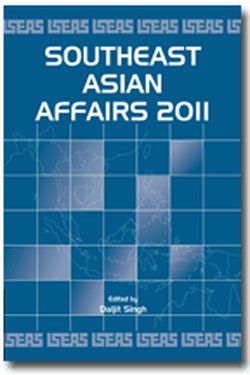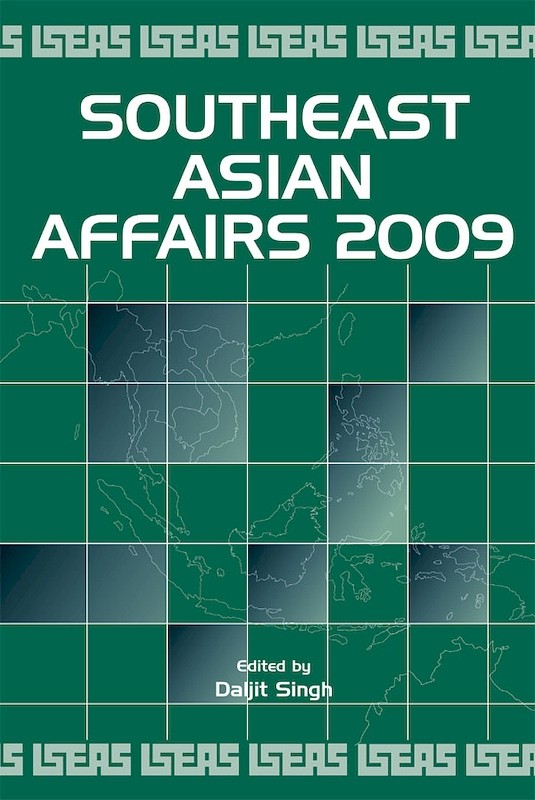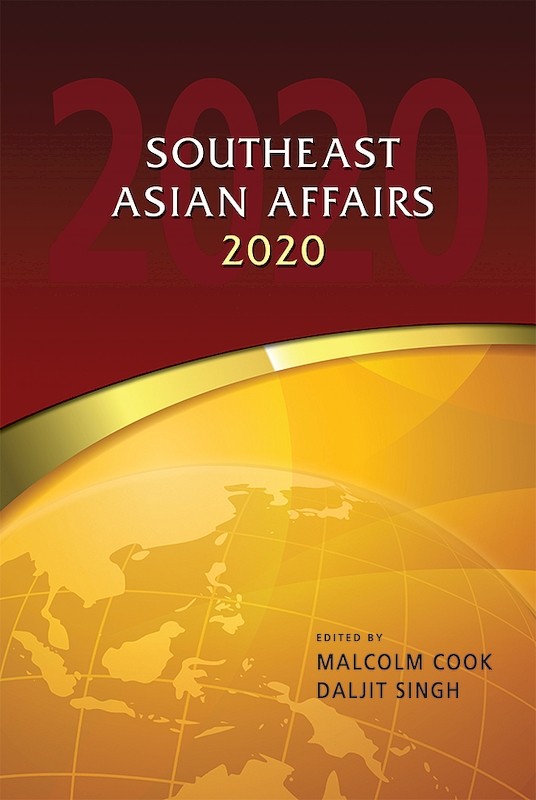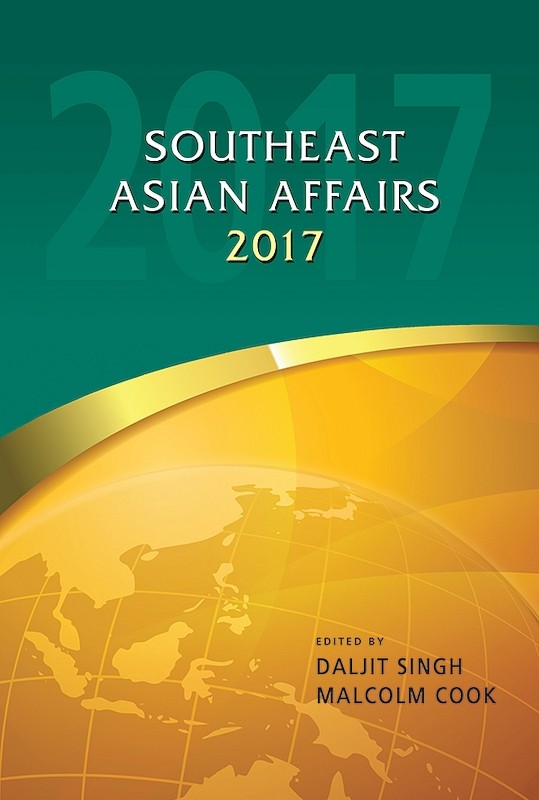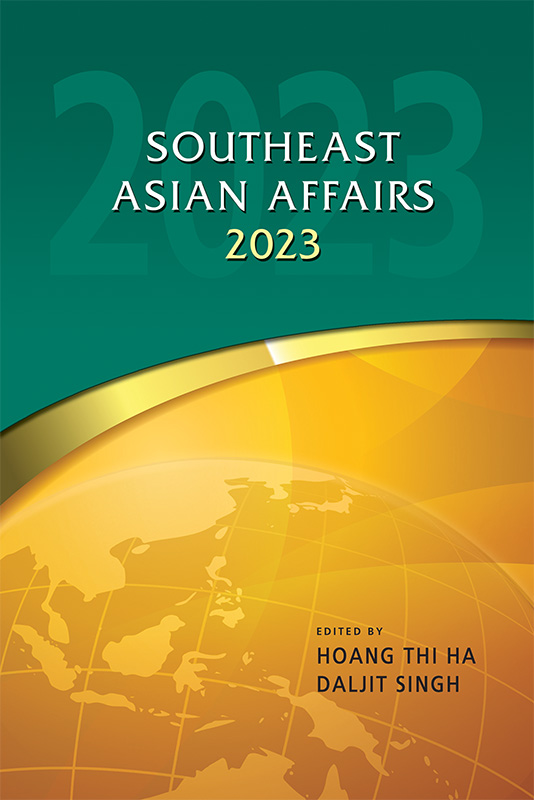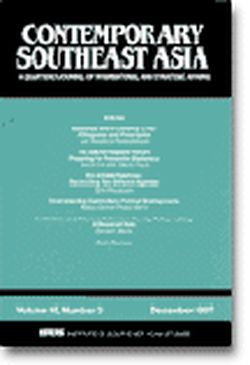Southeast Asian Affairs 2012
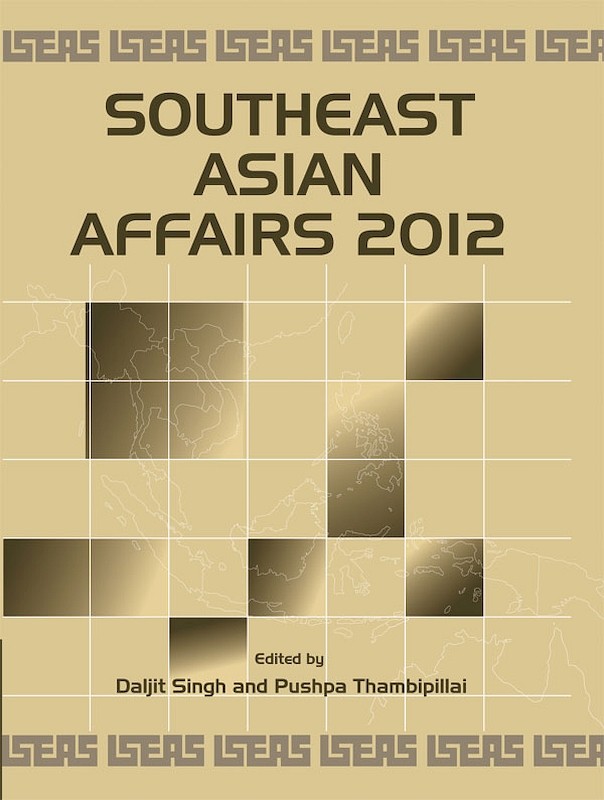
About the publication
“Founded in 1974, Southeast Asian Affairs provides, without fear or favour, informed and in-depth annual analyses of this vibrant region and its component countries. It is the only publication which does this and is in its own class without peers. It is a mandatory reference and read for those seriously interested in knowing Southeast Asia.”
—Professor A.B. Shamsul, Founding Director, Institute of Ethnic Studies, Universiti Bebangsaan Malaysia.
“Now in its 39th edition, Southeast Asian Affairs offers an indispensable guide to this fascinating region. Lively, analytical, authoritative, and accessible, there is nothing comparable in quality or range to this series. It is a must read for academics, government officials, the business community, the media and anybody with an interest in contemporary Southeast Asia. Drawing on its unparalleled network of researchers and commentators, ISEAS is to be congratulated for producing this major contribution to our understanding of this diverse and fast-changing region, to a consistently high standard and in a timely manner.”
—Hal Hill, H.W. Arndt Professor of Southeast Asian Economies, Australian National University
Contents
-
Southeast Asian Affairs 2012
[Whole Publication, ISBN: 978-981-4380-25-6] -
Preliminary pages
- THE REGION
-
Southeast Asia and ASEAN: Running in Place, by Donald E Weatherbee, author
-
Southeast Asian Economies: Moderating Growth Momentum, by Sanchita Basu Das, author see abstractThe Southeast Asian Economies are facing headwinds from the ongoing European crisis and the lack of recovery in the US. This has had a significant impact on exports though the effect is not as pronounced as it was in the 2008 crisis. Coupled with this has been rising inflation which had forced the central banks in the region to hike rates, thus further slowing growth. To chart a way forward in 2012, the nations need to implement reforms for cultivating domestic and regional demand, promote price stability and invest on a large scale in infrastructure and human resource development.
-
Latent Danger: Boundary Disputes and Border Issues in Southeast Asia, by Barry Wain, author see abstractThe deadly fighting between Thailand and Cambodia this year did more than undermine ASEAN's credibility as a viable regional organization. Military clashes along their disputed border exposed a little recognized weakness in Southeast Asia: Countless bilateral border disagreements and other land and maritime boundary issues linger unresolved. While attention has focused on Chinas provocations in support of expansive claims in the South China Sea, Southeast Asian governments for decades have been content to ignore their own border problems. These dormant disputes may not flare into violence anytime soon, but Thailand's manipulation of the Preah Vihear temple for domestic political gain demonstrated their potential danger. Preah Vihear was supposedly settled in Cambodia's favour in 1962 by the International Court of Justice. Yet the way significant sections of Thai society risked war half a century later by rallying over Preah Vihear - behind a distorted version of history and a malign brand of nationalism -- was a warning to the region to put its house in order.
-
The Five Power Defence Arrangements at Forty (1971-2011), by Carlyle A. Thayer, author see abstractOn the fortieth anniversary of the Five Power Defence Arrangements (FPDA). Carlyle Thayer reviews its development over the past four decades and explains how it has become an important component of security architecture, providing a credible conventional deterrent to any potential aggressor, however unlikely the prospect of conventional war. He focuses on FPDAs programme of exercises which have evolved in recent years into large-scale combined and joint exercises.
-
How Will Southeast Asia Position Itself in Asia's Future in an Age of Scarcities?, by Jørgen Ørstrøm Møller, author see abstractSoutheast Asia's economy has for several decades benefitted from a combination of factors. Global growth was high with the U.S. in the forefront and China rising as a new economic superpower with a large pool of cheap labour. Resources were ample and cheap. There were no reasons to worry about the environment. The U.S. was a visible and tangible stabilizing power in Asia and in Southeast Asia. The Western economic model known as the Washington consensus had proved itself so there was a ready-made model to "buy" from the shelf. Under these conditions the Southeast Asia political leaders could mainly concentrate on managing economic growth. This is going to change fundamentally, in fact it already is. Global growth is markedly lower and will continue to be so. The Western economic model stands discredited having revealed flaws in its basic design and opened for unethical behaviour by many of what was regarded as the knights of the economy the financial wizards. The labour force is falling in China from year 2015. The U.S. has run into severe economic problems with substantial cuts in defence spending looming, which casts doubt over U.S. as a stabilizing power. Resource prices are going up auguring a shortage, which may and probably will hamper economic growth. The environment is calling for much more attention and much more money in the future. Southeast Asias political leaders confront a totally different political and economic environment. Instead of managing economic growth they need to create the conditions for economic growth a much more difficult task.
- BRUNEI DARUSSALAM
-
Making Progress Slowly, by Pushpa Thambipillai, author see abstractBrunei Darussalam, the "abode of peace", continues to address an array of issues in its own peculiar way, guided by the Malay Islamic Monarchy concept. Priorities in socio-economic development were, as in previous years, targeted at achieving the Vision 2035 and the Ten Year Development Plan. Various sound policies have been formulated but at times implementation seems slow, thus hampering some of the expected results. Nevertheless, in an economically and politically stable environment, the country is making steady progress towards achieving some of its national targets of economic diversification, social and spiritual development and greater involvement of its people in national affairs. Externally, the leadership has promoted Brunei's active bilateral relations and support for regional and international cooperation.
- CAMBODIA
-
Capitalist Transformation by Neither Liberal Democracy Nor Dictatorship, by Steve Heder, author see abstractSteve Heder observes that 20 years after the Paris Agreements, Cambodia has established itself as a politically sovereign state in a thriving capitalist part of Asia, but it is not a liberal democracy as envisaged in the 1991 Agreements. He discusses Prime Minister Hun Sen's dominance of the political and economic scene; the economic transformation of the country, including its participation in the Greater Mekong Subregion and engagement in international trade and investments; the trial of former Khmer Rouge leaders; and the border conflict with Thailand.
- INDONESIA
-
Yudhoyono's Legacy between Stability and Stagnation, by Marcus Mietzner, author see abstractAs Indonesia approaches the end of Yudhoyono's two-term presidency in 2014, both political commentators and ordinary citizens have begun to reflect on the essence of his historical legacy. In the eyes of Yudhoyono's sympathizers, he has maintained political stability, secured continuous economic growth and overseen Indonesia's return to the world stage. His critics believe, on the other hand, that Yudhoyono has squandered a golden opportunity by failing to use the country's stability in recent years to push for further institutional reform. Instead, they charge, Yudhoyono has complacently managed the country's stagnation in the political and economic arena, and in some areas even presided over attempts to roll back reforms. Developments in 2011 have handed strong material to both camps: undoubtedly, Indonesia's politics remained remarkably stable and its macroeconomic indicators have been exceptionally good; but behind this facade, political reforms have come to a standstill, conservative elites are actively working towards overturning important post-Suharto achievements, and the country's infrastructure continues to decay. This article reviews Indonesian key events and developments of 2011 and assesses how they will shape the polity Yudhoyono is likely to inherit to his successor in 2014
-
Financing Indonesia's Ageing Population, by Aris Ananta, author see abstractNot many people realize that a country such as Indonesia also faces ageing population, a process of rising percentage and number of older population. Even people in the country, i.e., Indonesia, may not know it. This paper first shows the challenge Indonesia has and will face in the next two decades, particularly on the financing of the booming of its older persons amidst its still relatively low per capita income and weak infrastructure. This paper recommends "an integrated policy package for the whole population" to cope with the financing issues. This package consists of four simultaneous policies: promotion of active ageing; abolishment of retirement age, seniority and juniority systems; development of market based insurance and pension, and creation of affordable and just universal social protection and pension for everybody.
- LAOS
-
A More Mature and Robust State?, by Christopher B Roberts, author see abstractChristopher Roberts provides a generally positive picture of Laos. The country's economy grew by about 8.3 per cent and the government was becoming more open and transparent. Its international relations with several countries expanded, contributing to more trade and foreign aid. However, some issues continued to pose challenges, for example, transnational crime including human trafficking and trade in illicit drugs. Human security like poverty eradication was one of the major development goals.
- MALAYSIA
-
Signs of the Times: Election Fever, Recurring Themes, and Political Malaise, by Afif Pasuni, Joseph Chinyong Liow, authors see abstractThe political turbulence that engulfed Malaysia after the 2008 general elections continued to define much of Malaysian politics in 2011. Four high profile developments, in particular, are analysed closely in this chapter: (1) the string of by-elections, (2) the Sarawak state elections, (3) the Bersih 2.0 rally, and (4) the persistence of religious controversies, in terms of their implications for widely anticipated general elections in 2012. The chapter finds that while the ruling Barisan Nasional coalition began the year with a string of by-election victories, these successes were quickly tempered by the opposition's gains in the Sarawak state elections. Likewise, the Najib admistration's attempt to win over fence-sitters through a slew of political and economic reforms, such as acceptance of recommendations for electoral reforms in the wake of Bersih 2.0, was circumscribed by the intensification of racial and religious discourse in the country.
-
Malaysia's Economic Growth Moderates, by G Sivalingam, author see abstractMalaysia's economic growth moderated to about 5 per cent in 2011 after it had grown by 7.2 per cent in 2010. The economy could not grow at a faster rate in 2011 because of the base effect and the continuing decline in external demand. The services sector showed rapid growth as a result of the liberalization of 27 service sub-sectors. Inflationary pressures built up throughout the year and the government used monetary and fiscal policy tools to contain inflation. The current and the financial and capital account of the balance of payments were in surplus and as a result the international reserves of the country increased. The banking system was stable and loan growth was stable as a result of favorable credit conditions. The capital market was vibrant with the Islamic bond market attracting oil money from the Middle East. There was full employment and wage increases in some sectors of the economy.
- MYANMAR
-
No Turning Back, by Moe Thuzar, author see abstractMoe Thuzar discusses the rapid pace of reforms in Myanmar. She sees the beginnings of a convergence of interests between the military-backed government headed by President Thein Sein, the democracy proponents symbolized by Aung San Suu Kyi and the international community. Myanmar faces challenges in political reform, economic development and national integration. The government is eager to establish its international credentials as more foreign partners seek to forge political and economic ties.
-
The Problem of Democracy in the Republic of the Union of Myanmar: Neither Nation-State Nor State-Nation, by David I Steinberg, author see abstractBeset by ethnically arbitrary boundaries and with the historic separation of ethnic minorities under colonial rule, Burma/Myanmar as a paradigm of a "nation-state" has neither proven to be effective in analysis of the ethnic problems facing that society and their relation to democracy, however defined, nor of balanced foreign policy formulation toward it. The concept of "state-nation" - multiple identities within a national ideological superstructure - may prove more apt, but even with the concessions made to the minorities under the constitution of 2008, in force in 2011, these are unlikely to satisfy minority federal aspirations and will not lead to more democratic forms of governance over the near term without significant alterations in the policies and attitudes of the dominant Burman military.
- PHILIPPINES
-
Aquino: Pushing the Envelope, Single-mindedly, by Aileen S P Baviera, author see abstract2011 was a period of testing limits for the Aquino government. It pushed the envelope in terms of what the Executive can demand from the Legislature and the Judiciary in the campaign to curb corruption. The main targets were former president Gloria Arroyo and individuals perceived to be blocking efforts to hold her accountable for her wrongdoings, including the Chief Justice of the Supreme Court.The Aquino administration also pushed the envelope in its foreign policy by challenging allies and neighbors to take more concrete action to resolve long-standing territorial problems and to help address concerns about a rising military power on the horizon.This government was seen to have made mistakes and was much criticized in the last year. Still, it remains popular among a public tired of corrupt politics and who see in Aquino the resolve to do something about it.
-
The Philippines' National Territory, by Rodolfo C Severino, author see abstractThis article urges the Philippines to make up its mind on the various controversial issues surrounding the definition of the Philippines territory and maritime regimes and take definitive national positions on them. Noting that the Philippines is one of the very few countries that define their national territories in their respective constitutions, the article specifically calls on Manila to decide on these issues: * The nature of the waters between the archipelagos baselines and the Treaty of Paris limits; * Whether considering those waters as other than territorial waters would require a constitutional amendment; * How to regard the Sulu Sea and the Moro Gulf and whether doing away with their internal-waters status would require a constitutional amendment; * Whether, when and where to make to the UN submissions on the countrys extended continental shelves other than the one that it has already made; and * What the Philippines should do about its Sabah claim.
- SINGAPORE
-
Transitioning to a "New Normal" in a Post-Lee Kuan Yew Era, by Eugene K B Tan, author see abstractIn his review of Singapore, Eugene Tan observes that the general election of 2011 could be the starting point of political transition to a two-party or multi-party democracy. The opposition was able to tap into the general mood that the Peoples Action Party (PAP) government had not been responsive to the concerns of the average Singaporean and that it would be desirable to have some checks on it. Having safely secured a PAP government in the general election, though with a strengthened opposition, Singaporeans could take the liberty to make their point again in the Presidential election, which saw the candidate perceived to be favoured by the government winning only by a razor-thin margin.
-
A Return to Normal Politics: Singapore General Elections 2011, by Terence Chong, author see abstractOn 7 May 2011, the People's Action Party (PAP) returned to power with its lowest share of the popular vote since 1963. In the aftermath of the General Elections, a slew of ministers left the Cabinet, most notably of all, former Minister Mentor Lee Kuan Yew. This chapter seeks to analyse the factors that contributed to the electoral results in the Singapore General Elections, as well as examine its ramifications for the ruling PAP and the political landscape in general.
- THAILAND
-
Thaksin Survives Yet Disquiet Floods the Kingdom, by Nicholas Farrelly, author see abstractSince the coup of September 2006 Thailand has struggled through a difficult period of political and social unrest. In 2011 the election triumph of Yingluck Shinawatra and her Pheua Thai Party demonstrated the continued popularity of her brother, deposed former Prime Minister Thaksin. Inevitably, the election result failed to generate any resolution to the country's political polarisation and conflicts. The year will also be remembered for devastating flooding across the country: over 500 people died and millions endured months of disruption and hardship. Bangkok and surrounding provinces were seriously impacted and the country's economic performance, especially in the crucial manufacturing and agricultural sectors, suffered as a result. In 2011 Thailand continued to experience violence in the three southernmost provinces where a decade-long conflict, involving a wide range of criminal, insurgent and official groups, shows no sign of ending. Persistent ambiguity about the role of the monarchy in national life, and questions about plans for the succession when King BhumibolAdulyadej dies, added to the disquiet as Thais seek a new political equilibrium for their country.
-
From Inward to Outward: An Assessment of FDI Performance in Thailand, by Aekapol Chongvilaivan, author see abstractThis paper essentially takes stock of FDI, both inward and outward, in Thailand and assesses its potential and performance. The recent developments witnessed a resurgence of inward FDI which has by and large set the stage for Thailand's robust economic recovery. Concurrently, Thai firms have increasingly started to depart from their comfort zones, explore new business opportunities, and thrive on synergies and complementarities with new partners by venturing overseas. Nevertheless, several drawbacks critically hamper the country from fully exploiting its massive potential, such as its passive strategy towards FDI, inadequate infrastructure and institutional quality, and unsatisfactory capacity of local entrepreneurs to venture overseas.
- TIMOR-LESTE
-
A More Confident or Overconfident Foreign Policy Actor?, by Selver B. Sahin, author see abstractThe Timorese leadership has prioritized three key policy objectives in the broader context of nation-building: phasing out the foreign military and security presence, joining ASEAN at the earliest possibility and setting a model for "post-conflict" development. This reflects their growing confidence in the governance of the country's development and institutional affairs. This new-found confidence, largely driven by an increasing oil wealth, can be seen as natural following a long history of conflict and a period of instability after independence. Yet, a balanced appreciation of the political and social outlook in Timor-Leste over the last year must also take into consideration the ongoing challenges faced by the country particularly in relation to institutional and socio-economic development processes.
- VIETNAM
-
A Glass Half Full or Half Empty?, by David Koh Wee Hock, author see abstractIn 2011 Vietnam witnessed two important elections, economic setbacks, and some turbulence in its relations with China. The completion of the 5-yearly Party National Congress and the National Assembly elections meant the completion of leadership succession, but these elections arguably did nothing special for the country in terms of political reforms, which the country needs now, than the first ??i M?i Congress in 1986. In addition the economy in 2011 continued to mire in high inflation, high interest rates, and a serious confidence deficit in view of continuing trade and budget deficits, although nominal growth rates are still respectable. Vietnam also took a tougher position in the face of Chinese challenges in the South China Sea without giving up the fine balance that it has always to maintain in its relations with its most important and gigantic neighbour.

